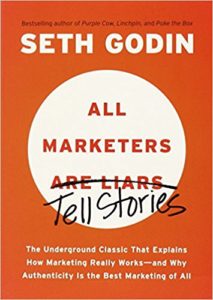I just got done reading this book by Seth Godin and found it fascinating. As always, Seth uses only a handful of pages to reveal A LOT about a subject. It’s very powerful.
 I’m trying to get better at incorporating storytelling into my own work. I recently shared one of my own stories (finding my birth mother) and that video went viral.
I’m trying to get better at incorporating storytelling into my own work. I recently shared one of my own stories (finding my birth mother) and that video went viral.
I now realize how impactful storytelling is and I want to get better at it. I want more people to identify with who I am, what I care about, and the emotions that I’m feeling. I also want to share stories that cause them to be moved and affected and share in the experience.
This book was killer because it revealed a lot of the ways HOW to do this and why it’s so effective. I’m going to share some of my notes down below. As I went through this book, I resonated with the chapters on frames and lying.
It might make you a little bit uneasy to call yourself or other marketers liars. It’s also a BOLD claim to say that people want to lie to themselves. But, it’s completely true.
No matter what stage of marketer you are, go and grab a copy of All Marketers are Liars. You’ll be glad you did. Tons of golden nuggets in this book.
My notes on this book
- Stories are shortcuts we use because we’re too overwhelmed by data to discover all the details
- Nobody buys a product or service. They buy the way the process makes them feel.
- The facts are irrelevant. Doesn’t matter if something is better or faster or more efficient. What matters is what the consumer believes.
- No matter what you sell, the path to profitable growth is in satisfying wants, not needs.
- Truly great stories succeed because they are able to capture the imagination of large or important audiences.
- Talented marketers understand that the prospect is ultimately telling himself the lie, so allowing him to draw his own conclusions is far more effective than just announcing the punch line.
- Great stories don’t appeal to logic they appeal to our senses.
- The best stories don’t teach people anything new. They agree with what the audience already believes and makes the member of the audience feel smart and secure when reminded how right they were in the first place.
- People tell themselves stories and work hard to make them true. People find stories or lies that will benefit them if it spreads. They embellish it too.
- Live and breathing stories. They’re lying to themselves. A complete dedication to and embrace of your story.
- Entire industries were born, stores were invented just to sell the things that were now in demand because of commercials.
- Your worldview is the sense that you use to determine whether or not you’re going to believe a story. Lenses distort things.
- A frame is a way you hang a story on to a consumer’s existing world view.
- Your opportunity lies in finding a neglected worldview, framing your story in a way that this audience will focus on and going from there.
- Worldview is not forever. It’s what the consumer believes right now.
- Marketing success when you tap into an audience of people who share a worldview – a worldview that makes that audience inclined to believe the story the marketer tells.
- Share stories that match their worldview.
- Niche has to share a worldview and be ready and able to influence a large group of their friends.
- Hard to hold contradictory ideas in head.
- People only notice stuff that’s new and different. The moment they notice something new, they start to make guesses about what to expect next.
- If it’s a good story, if that story is framed in terms of his worldview, then he’ll tell himself the story and believe in the lie.
- People make decisions big and small based on just one thing: the lie we tell ourselves about what we’re about to do.
- The market for votes is filled with consumers who have already committed to a worldview, who have a bias in favor of their current choice and are delighted to ignore or even denigrate alternative brands. The temptation in politics is to be so certain of the facts of your case that you arrogantly believe you can persuade people to change their mind.
- People buy stuff because of the way it makes them feel.
- If a consumer figures something out or discovers it on her own, she’s a thousand times more likely to believe it than if it’s just something you claim.
- What people want is a story, a lie they can tell themselves and their friends.
- Storytelling works wen the story actually make the product or service better.
- Because people want to believe a story, they will convince themselves of it.
- If you are able to live the story you want to tell, the people youer’ telling it to are more likely to believe it because you’ll get all the details right.
- The best stories promise to fulfill the wishes of a consumer’s worldview. They offer:
- Miracle, short cut, money, social success, safety, ego, fun pleasure belonging.
- Or play on fear by promising to avoid the opposite of all the things above.
- Once consumer has bought someone else’s story and believes that lie, persuading the consumer to switch is the same a persuading him to admit he was wrong. People hate to admit they’re wrong. You have to tell a different story.
- A product is sometimes nothing but a souvenir of your trip to the store and a reminder of the way you felt when you bought it.
- Don’t try to change someone’s worldview. Fit your story to their worldview.
Don’t forget to grab a copy of All Marketers are Liars by Seth Godin.
Thanks for reading!
